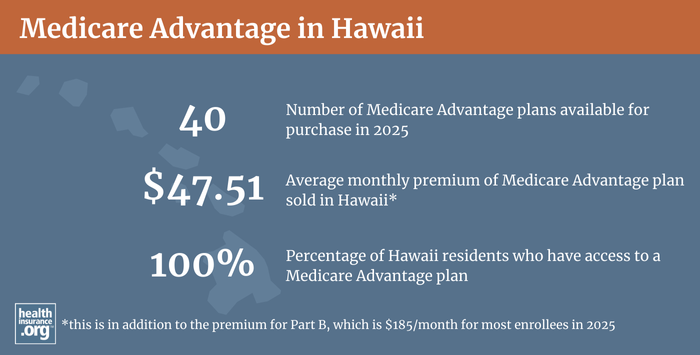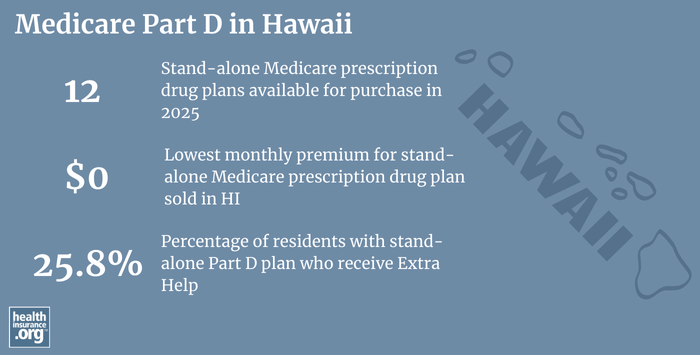
Medicare in Hawaii
Original Medicare, Medicare Advantage, Part D prescription drug, and Medigap coverage in Hawaii
Key takeaways
- Over 305,000 residents are enrolled in Medicare in Hawaii.1
- More than 53% of Hawaii Medicare beneficiaries opt for coverage from Medicare Advantage plans.1
- Availability of Medicare Advantage plans in Hawaii varies by county.2
- More than 230,000 Hawaii Medicare beneficiaries have Medicare Part D prescription drug coverage; the majority have Medicare Part D prescription drug coverage via Medicare Advantage plans.1

Medicare enrollment in Hawaii
As of August 2024, 305,871 Hawaii residents1 were enrolled in Medicare.
Medicare, a federal health insurance program for people 65 or older, and certain younger people with disabilities, operates under the guidance of the Centers for Medicare & Medicaid Services (CMS). CMS is part of the federal Department of Health and Human Services (HHS).
Medicare beneficiaries can choose to receive their benefits directly from the federal government via Original Medicare — along with private supplemental coverage for prescriptions and out-of-pocket costs — or enroll in private Medicare Advantage plans.
Original Medicare includes Medicare Part A and Medicare Part B. Medicare Part A (also called hospital insurance) helps pay for inpatient stays, like at a hospital, skilled nursing facility, or hospice center. Medicare Part B (also called medical insurance) helps pay for outpatient care like a visit to a nurse practitioner, doctor, or physician assistant and preventive healthcare services, such as most vaccinations).
Medicare Advantage includes all of the benefits of Medicare Parts A and B, most Medicare Advantage plans include prescription drug coverage and may offer additional benefits like dental and vision — for a single monthly premium. But members of Medicare Advantage plans may be required to use a limited provider network for the Medicare plan they select, and total out-of-pocket costs (like deductibles, co-payments, or co-insurance) may be higher than they would be under Original Medicare plus a Medigap plan. There are pros and cons to either option, and no single solution that works for everyone.
- Read our guide to Medicare’s open enrollment period.
- Understand the difference between Medigap, Medicare Advantage, and Medicare Part D (including tips for picking the best coverage combination to meet your needs).
For most people, filing for Medicare is part of turning 65. But Medicare coverage is also available to people under the age of 65 who have been receiving disability benefits for at least two years, or who have ALS or end-stage renal disease. Nationwide, 89% of Medicare beneficiaries are eligible due to being at least 65 years old, while the other 11% are under 65.3 Hawaii has the smallest percentage of disabled Medicare beneficiaries of any state in the country; about 6.5% of Hawaii Medicare beneficiaries are under age 65. The other 93% of Hawaii’s Medicare beneficiaries are age 65 or over.1
Hawaii has the smallest percentage of disabled Medicare beneficiaries of any state in the country; less than 7% of Hawaii Medicare beneficiaries are under age 65. More than 93% of Hawaii’s Medicare beneficiaries are at least 65 and eligible due to their age.1
Learn about Medicare plan options in Hawaii by contacting a licensed agent.



Explore our other comprehensive guides to coverage in Hawaii

The ACA Marketplace allows individuals and families to shop for and enroll in ACA-compliant health insurance plans. Subsidies may be available based on household income to help lower costs.


Hoping to improve your smile? Dental insurance may be a smart addition to your health coverage. Our guide explores dental coverage options in Hawaii.


Learn about Hawaii’s Medicaid expansion, the state’s Medicaid enrollment and Medicaid eligibility.


Short-term health plans provide temporary health insurance for consumers who may find themselves without comprehensive coverage. Learn more about short-term plan availability in Hawaii.

Frequently asked questions about Medicare in Hawaii
What is Medicare Advantage?
Nationwide, about 50% of Medicare beneficiaries have Medicare Advantage plans.3 Hawaii is among a handful of states where more than half of Medicare beneficiaries are enrolled in Medicare Advantage plans. As of August 2024, about 54% of Hawaii Medicare beneficiaries had Medicare Advantage plans, and roughly 46% had Original Medicare.1
Hawaii has five counties, and the availability of Medicare Advantage plans varies by county. In Honolulu County for 2024, Medicare beneficiaries can select from among 20 different Medicare Advantage plans.2 But in Kauai County, there are 14 Medicare Advantage plans offered.2
There are 40 Medicare Advantage plans available statewide in Hawaii for 2025.4 But again, plan availability varies considerably from one area to another, and that will continue to be the case.
Medicare Advantage enrollment is available when a person is first eligible for Medicare, and there’s also an Annual Election Period (AEP) each fall (October 15 – December 7) when beneficiaries can enroll in Medicare Advantage plans if they choose to do so. And there is another window — the Medicare Advantage Open Enrollment Period (January 1 to March 31) — during which people who are already enrolled in Medicare Advantage can change to a different Medicare Advantage plan or drop their Medicare Advantage plan and enroll in Original Medicare instead.

What are Medigap plans?
Medigap plans are used to supplement Original Medicare, covering some or all of the out-of-pocket costs (for coinsurance and deductibles) that people would otherwise incur if they only had Original Medicare on its own.
As of 2025, there are 12 insurance companies offering Medigap plans in Hawaii.5
Medigap plans are standardized under federal rules, although states can add their own regulations. Hawaii’s Medigap regulations are available here.
The state also requires (see §16-12-6.2) all Medigap insurers to offer all plans on a guaranteed-issue basis (and without adjusting premiums based on medical underwriting) to any enrollee during the six-month window that begins when the person is enrolled in Medicare Part B. This applies regardless of age in Hawaii. Federal law grants a six-month guaranteed-issue open enrollment window, but only when people are enrolled in Part B and also age 65. So Hawaii’s law extends the same protections to people who are under 65 and eligible for Medicare as a result of a disability. As noted above, Medicare in Hawaii has the nation’s lowest percentage of beneficiaries who are eligible due to a disability.
The majority of the states have adopted rules to ensure at least some access to Medigap plans for enrollees under the age of 65, but unlike most of them, Hawaii also prohibits Medigap insurers from charging higher premiums for people under the age of 65, based on their disability. So while it’s common to see under-65 Medigap policies sold in other states with premiums that are well above the age-65 premiums, that’s not the case in Hawaii.
And Hawaii lawmakers considered legislation in 2023 that would take the state’s Medigap consumer protections even further. H.B.539/S.B.64 would require Medigap insurers to make their products guaranteed-issue year-round, regardless of a person’s medical history. Neither bill passed in the 2023 session. But S.B.64 crossed over to the House in March, and legislation from odd-numbered years carries over to the next year in Hawaii’s legislature, so these measures could be reconsidered in 2024.
Under federal rules, Medicare beneficiaries can apply for a Medigap plan at any time, but medical underwriting can be used if the person’s initial six-month enrollment window has ended. Hawaii ensures that people get that six-month window even if they’re under 65. But H.B.539 and S.B.64 would eliminate medical underwriting altogether for Hawaii’s Medigap plans. As of 2023, only New York and Connecticut offer this level of guaranteed-issue Medigap protections.
What is Medicare Part D?
Outpatient prescription drugs are not covered by Original Medicare. However, Medicare beneficiaries can get coverage for prescription drugs via a Medicare Advantage plan that includes integrated Medicare Part D prescription drug coverage, an employer-sponsored plan (offered by a current or former employer), or a stand-alone Medicare Part D prescription drug plan (a Medicare PDP).
There are 12 Medicare Part D standalone prescription drug plans in Hawaii. For 2025 coverage, insurers are offering, with premiums starting at $0.4
As of July 2024, there were 71,566 people with Medicare in Hawaii who were covered by stand-alone Medicare Part D prescription drug plans.1 Another 158,698 beneficiaries had Medicare Part D prescription drug coverage integrated with their Medicare Advantage plans,1 so the majority of Medicare Part D prescription drug coverage in Hawaii is provided via Medicare Advantage plans as opposed to stand-alone Medicare Part D prescription drug plans (most Medicare Advantage plans include Medicare Part D prescription drug coverage; stand-alone Medicare Part D prescription drug plans are usually used to supplement Original Medicare, since it never includes prescription coverage).
Medicare Part D prescription drug enrollment is an option when a person first submits their Medicare application in Hawaii, or when they lose access to other creditable prescription drug coverage (e.g., they retire and lose the prescription drug coverage that they had when employed). The Annual Open Enrollment Period (AEP) that runs from October 15 to December 7 each year is also an opportunity for Medicare beneficiaries to sign up for a Medicare Part D prescription drug plan or switch to a different Medicare Part D prescription drug plan.

What additional resources are available for Medicare beneficiaries and their caregivers in Hawaii?
For more information about Medicare benefits in Hawaii or for assistance applying for Medicare coverage, try one of these resources.
- Visit the Hawaii State Health Insurance Assistance Program website with questions related to Medicare in Hawaii.
- Read an overview of Medicare from Hawaii’s Employer-Union Health Benefits Trust Fund.
- The Medicare Rights Center website is also an excellent resource for Medicare-related questions. You can also call their national helpline number: 1-800-333-4114.
Louise Norris is an individual health insurance broker who has been writing about health insurance and health reform since 2006. She has written hundreds of opinions and educational pieces about the Affordable Care Act for healthinsurance.org.

Looking for more information about other options in your state?
Need help navigating health insurance options in Hawaii?
Explore more resources for options in HI including ACA coverage, short-term health insurance, dental and Medicaid.
Speak to a sales agent at a licensed insurance agency.
Footnotes
- “Medicare Monthly Enrollment – Hawaii.” Centers for Medicare & Medicaid Services Data. Accessed December, 2024. ⤶ ⤶ ⤶ ⤶ ⤶ ⤶ ⤶ ⤶ ⤶
- ”Medicare Advantage 2024 Spotlight: First Look” KFF.org Nov. 15, 2023 ⤶ ⤶ ⤶
- ”Medicare Monthly Enrollment – US” Centers for Medicare & Medicaid Services Data, December 2024. ⤶ ⤶
- ”Fact Sheet: Medicare Open Enrollment for 2025” (35) Centers for Medicare & Medicaid Services. Sep. 27, 2024 ⤶ ⤶
- “Explore your Medicare coverage options.” Medicare.gov. Accessed December, 2024. ⤶

